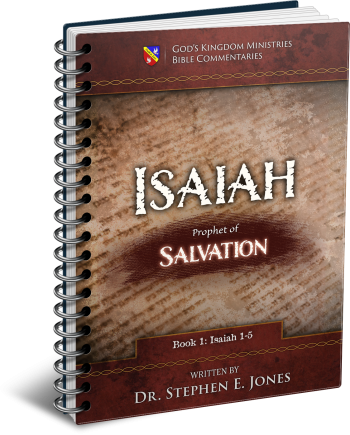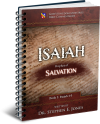Latest Posts
View the latest posts in an easy-to-read list format, with filtering options.

Isaiah is the prophet of Salvation. He is also known as the truly "Universalist" prophet, by which is meant that He makes it clear that salvation is extended equally to all nations and not just to Israel. He lived to see the fall of Israel and the deportation of the Israelites to Assyria, and he prophesied of their "return" to God (through repentance). He is truly a "major prophet" whose prophecies greatly influenced the Apostle Paul in the New Testament.
Category - Bible Commentaries

Isaiah 1:1 begins,
1 The vision of Isaiah the son of Amoz concerning Judah and Jerusalem, which he saw during the reigns of Uzziah, Jotham, Ahaz and Hezekiah, kings of Judah.
The first thing we learn is that Isaiah was the son of Amoz, which means “strong.” We have already shown how the heart of Isaiah’s message was the New Covenant and how God is both righteous and strong. Hence, we see that Isaiah himself represents salvation, and his father is strong enough to save.
Secondly, Isaiah was from Judah, even as Yeshua-Jesus was from Judah. Was it possible that Isaiah was from Bethlehem as well? We are not told. Yet we know that he had a lengthy ministry that extended through four kings in Jerusalem. Tradition says that he was put into a log and sawn asunder in the reign of Hezekiah’s son, Manasseh.
Isaiah’s first “vision” begins in Isaiah 1:2,
2 Listen, O heavens, and hear, O earth, for the Lord speaks, “Sons I have reared and brought up, but they have revolted against Me.”
Isaiah treats this as a statement in a court of law, calling both heaven and earth to witness what is being stated. God then speaks, referring back to Israel’s birth from Egypt, calling them “sons.” So also Hosea 11:1 says,
1 When Israel was a youth I loved him, and out of Egypt I called My son.
The same revelation was given to Moses in Exodus 4:22,
22 Then you will say to Pharaoh, “Thus says the Lord, ‘Israel is My son, My firstborn’.”
These were “sons” in that God was their heavenly Father. Their mother, of course, was Egypt, making them spiritual Ishmaelites, or donkeys (Gen. 16:12), which were in need of redemption to turn them legally into the sheep of His pasture (Exodus 13:12-14). The Passover lamb thus redeemed them and accomplished this legal maneuver, and this prophesied of things to come, when Jesus Christ, our Passover Lamb came to do so in a greater way.
The problem in Isaiah’s day was that those who were supposed to be “sons” of God were not acting like sons. They had reverted to the stiff-necked condition (a rebellious will) of spiritual donkeys. Jeremiah 2:24 complained of the same thing a century later. The Apostle Paul later refers to such people as children of the flesh (Rom. 9:7, 8; Gal. 4:29). In other words, their “sonship” position was based on fleshly genealogy and natural birth, rather than being begotten by the Spirit.
Such fleshly children, Paul says, are not inheritors of the Kingdom but must be “cast out” with their “mother,” the earthly Jerusalem (Gal. 4:25, 30).
Even so, because of the New Covenant, we know that God will turn the hearts of all men to Himself in the end, because “every knee will bow.” But before that happens, Hagar must be cast out in order to prove to all that no one can inherit the Kingdom by claiming to be a fleshly child of Abraham. They must renounce Hagar and claim Sarah as their spiritual mother. They must stop advocating for the earthly Jerusalem as the true mother of the Kingdom.
God will certainly save all Israel and all of creation. However, He will not do so until they repent, bow their knees to Jesus Christ, and profess their allegiance to Him. The New Covenant states that God is able to make this happen. He will not merely save everyone in their carnal state of rebellion. No, He will cause them to repent and to bow their knees, not out of compulsion, but by revealing Himself to them. Paul interprets Isaiah by paraphrasing him slightly in Phil. 2:11,
11 and that every tongue will confess [exomologeo] that Jesus Christ is Lord, to the glory of God the Father.
Their confession (exomologeo) is not extracted by force upon unwilling people. The word means “to acknowledge openly and joyfully, to profess that one will do something, promise, agree, engage.”
At the Great White Throne judgment, when all see Jesus for who He really is, when all finally know that He is Love personified, that His love compelled Him to swear an oath to turn every heart to Himself, then they will be awestruck at the salvation which they had previously ignored or rejected for lack of understanding or inspiration.
This is the only way that their confession can be made “to the glory of God the Father.”